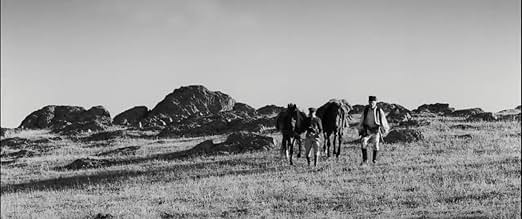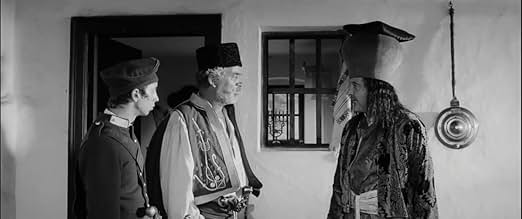Der Polizist Costandin, der Anfang des 19. Jahrhunderts in Rumänien spielt, wird von einem Adeligen angeheuert, um einen Zigeunersklaven zu finden, der von seinem Anwesen weggelaufen ist, na... Alles lesenDer Polizist Costandin, der Anfang des 19. Jahrhunderts in Rumänien spielt, wird von einem Adeligen angeheuert, um einen Zigeunersklaven zu finden, der von seinem Anwesen weggelaufen ist, nachdem er eine Affäre mit seiner Frau hatte.Der Polizist Costandin, der Anfang des 19. Jahrhunderts in Rumänien spielt, wird von einem Adeligen angeheuert, um einen Zigeunersklaven zu finden, der von seinem Anwesen weggelaufen ist, nachdem er eine Affäre mit seiner Frau hatte.
- Auszeichnungen
- 23 Gewinne & 7 Nominierungen insgesamt
Empfohlene Bewertungen
"Aferim!" is an Ottoman Turkish expression meaning "bravo!," a word used with deep irony in the film but one that can equally be directed, without any irony, at the director. A great deal of the freshness lies in the way Jude dispenses with traditional historical-film trappings even while cleaving to the classic structure of fugitive-hunting Westerns.There's nothing staid or prettified here, and while a significant amount of background research is on show, the helmer uses it to re-create an atmosphere rather than a specific, sacrosanct event.
Beautifully shot from a necessary distance by Marius Panduru in black and white, the movie smoothly fades in and out of images, thoughts, prejudices and superstitions characteristic of a society marked by poverty, corruption, racism, xenophobia, misogyny, and religious intolerance. Things of the past, one might say, things of the past.
Teodor Corban gives Constandin determination, humor and a certain kindness, mainly directed toward Ionita (a well-cast Mihai Comanoiu) and rarely toward the gypsy slave Carfin (Toma Cuzin, in a convincing role). Mihale Sirbu and her tormented character Sultana skillfully navigate the dangerous waters of passion and fear, especially in the menacing presence of boyar Iordache (Alexandru Dabija). In a deceptively easy role, Alexandru Bindea portrays a Priest who summarizes the mentalities of the time.
So, is "Aferim!" a masterpiece? Unfortunately, although it comes so close, is not. Shot in only 23 days (according to an interview given by Radu Jude) the movie appears to be assembled in a hurry. The verbal and physical violence is overwhelming. After seeing the movie, go home and hide all scissors! Radu Jude decided that cruelty is the legacy of that era and should also be the mark of his movie. He placed the most violent scene at the very end to shock the audiences and festival juries, with vastly different results. Should that scene had been placed earlier, the mark of the movie could have been the donquixotesque father and son horseback trip across Wallachia in search of the meaning of life. Too bad that instead of a masterpiece we got a master and a piece.
Along the way the two men come across many more Roma – whom they refer to as 'Crows' (because crows are black) and treat them like the underclass they believe them to be. They also run into a number of other – less than savoury – characters including the World's most xenophobic Priest. What follows is story that can be seen as comedic, harrowing and at times almost bewildering in its depiction of what times were like. The enslavement of the Roma is a subject rarely mentioned and so this is groundbreaking in many ways.
It is filmed in black and white and is lit in such a way to make this seem many years older than it is, Director Radu Jude said this is a western and did a lot to evoke the early westerns in theme and composure of the story, but he has also created a film that is unique too. There is violence here and scenes that some may find upsetting but it is just an amazing watch. Languages are Romanian, Turkish and Roma with OK sub titles to be fair. The title 'Aferim' means 'bravo' in Turkish and as the Romanians hated the Ottoman Empire it is ironic that they use this word as a form of praise – but that is intentional. Nominated for the 88th Academy Award for Best Foreign Language film I feel this is in with rather a big chance and is a film that I can absolutely recommend to all World cinema fans.
It's a rare Romanian historical drama set before the 20th century (with the exception of historical biopics of communist era). It's thematically a Western (or Eastern), since it involves a long journey on horseback, strongly and intentionally recalling "The Searchers". Most importantly, it's an endless series of interchanges with representatives of society back then, by which virtually every social problem of the present day is touched.
The genius of this film is that it follows a timeline, through which the spectator is at times bemused and at times horrified by the behavior of the main protagonist, a constable charged with capturing a runaway slave accompanied by his inept son. In a thoroughly realistic way unlike any historical film I have ever seen, we see him treat priests and nobles with respect and peasants and Roma with indifferent cruelty. Sometimes he shows a conscience, as when bonding with his son or asking the slave owner for clemency upon returning him. Sometimes he is shockingly ruthless, like when he sells a Rom boy they also picked up to a passing noble because he wants to afford drinking and whoring.
Not only is this the first portrayal of slavery in Romania, a topic not taught in schools and therefore quite controversial. It is a completely naturalistic portrayal as well, unlike any emotionally charged tales out of Hollywood. It easily beats the credibility of "12 Years a Slave", because Jude maintains a sardonic, matter-of-fact narrative instead of drenching his film in moral lessons about the nature of good and evil. Teodor Corban delivers his cop character as a product of his times, with no judgment or exoneration of his actions. If there is one slight weakness at all, it's that the dialogues are sometimes very fast and probably very difficult to translate. As a Romanian raised abroad, I found myself guessing at roughly half of the vocabulary, and even though I got most of the irony, I would not know how to explain it to foreigners and keep the meaning intact.
"Aferim!" means "Excellent!" as a Turkish exclamation (recalling that Wallachia at he time was a vassal to the Ottoman Empire - when the constable sends a Turkish carriage the wrong way to spite the Turks, this is how his son praises him. So the title perfectly describes the film in one word - a tale of a time when the ignorant hated everyone else, not realizing how similar they were. When the privileged few treated the abject poor as mere objects, aided by the apathy of commoners, who could not imagine any alternative. This horror mixed with irony resonated strongly with audiences, and would certainly justify a foreign language Oscar next year.
Wusstest du schon
- Wissenswertes"Aferim!" is an Ottoman Turkish expression meaning "Bravo!".
- PatzerWhen she talks with Constandin, Smaranda calls him Carfin once.
- Zitate
The Priest: Each nation has its purpose. The Jews, to cheat, the Turks, to do harm, us Romanians to love and suffer like Christ. And each has their habits. Hebrews reads a lot, Greeks talks a lot, Turks has many wives, Arabs has many teeth, Germans smokes a lot, Hungarians eats a lot, Russians drinks a lot, English thinks a lot, French likes fashion a lot, Armenians are lazy, Circassians wears much lace, Italians lies a lot, Serbians cheats a lot, Gypsies get beaten! Gypsies must be slaves.
- VerbindungenFeatured in Bir Sigmund Weinberg belge-meseli (2020)
- SoundtracksTipto tiptis
Original music composed by Antonie Pantoleon-Petroveanu (as Anton Pann)
Performed by Florin Iordan, Marian Cleante (violin), Sandu Constantin (vocals), Gheorghe Falcaru (whistle)
Top-Auswahl
- How long is Aferim!?Powered by Alexa
Details
- Erscheinungsdatum
- Herkunftsländer
- Offizieller Standort
- Sprachen
- Auch bekannt als
- 追拿吉普賽!
- Drehorte
- Produktionsfirmen
- Weitere beteiligte Unternehmen bei IMDbPro anzeigen
Box Office
- Budget
- 1.250.000 € (geschätzt)
- Bruttoertrag in den USA und Kanada
- 108.110 $
- Eröffnungswochenende in den USA und in Kanada
- 15.892 $
- 24. Jan. 2016
- Weltweiter Bruttoertrag
- 350.110 $
- Laufzeit1 Stunde 48 Minuten
- Farbe
- Seitenverhältnis
- 2.35 : 1
Zu dieser Seite beitragen





























